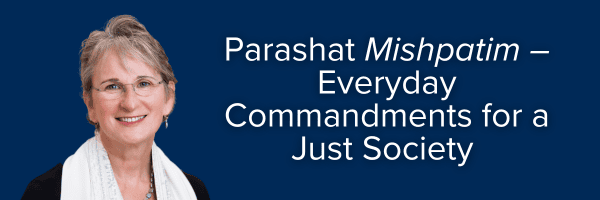Last week we read the dramatic story of the giving of the Ten Commandments. There was thunder and fire and God’s voice booming from the mountain top. Good movies come from Parshiot like that one! This week we find ourselves in a completely different setting, Parashat Mishpatim, lacks the excitement of its predecessor. It contains a long list of rules or laws that govern the Jewish community in ancient times. These laws deal with treatment of slaves, crimes of murder, personal injuries, unfair business practices as well as more challenging matters such as lying, witchcraft and idolatry. As in many places in the Torah, the Israelites are reminded to demonstrate sensitivity to the stranger because they were strangers in the land of Egypt.
This week’s b’nai mitzvah students might be disappointed that they missed the Mount Sinai/Ten Commandments portion by just one week. They might be upset that their Torah portion is so dry and seemingly flat compared to last week. But I find Mishpatim to be so very central to our tradition. So often we talk about, focus on, and highlight the Ten commandments – almost as if these are all the mitzot we have. (There are 613 of course!) Imagine what our society might be like if we only followed the ‘big ten.’ We might not murder, but what would compel us to give tzedakah or pay our workers on time? What is so important in Judaism is that there are many more commandments beyond the ten received at Mt. Sinai and those other commandments are what keep us doing the right thing day to day. As Rabbi Jessica Kirschner said in this week’s URJ Torah commentary, Mishpatim outlines a vision of society of interlocking rights and responsibilities, daily life and sacred celebrations. In particular, it cautions us to remember three principles which can be tempting to ignore or forget when not in our interest: 1)the privileged must look out for the vulnerable, 2)we have responsibilities even to our enemies, and 3)the people tasked with judging and enforcing the laws must take special care not to show bias, lest the whole system fall apart. (Please read Exodus 21:1−24:18 for details!)
Once again, the Torah speaks to us in our day even though it was written thousands of years old for a society that looked very little like ours. What could be more pertinent than these themes? The tradition calls to us now, as it did in ancient times, to care for those who are vulnerable, to engage with all people, even those with whom we are at odds, and to do it all with morality and fairness. Changes are underway in our society and even if and when change is needed, we must hold onto the guiding mitzvot of Mishpatim.
Shabbat Shalom,
Rabbi Amy Schwartzman


